Hundreds of transgender activists and allies rallied outside the Supreme Court on Dec. 4 as justices heard arguments in U.S. v. Skrmetti, a case challenging Tennessee’s law banning gender-affirming care for minors.
The rally, titled “Freedom to Be Ourselves,” was hosted by the American Civil Liberties Union (ACLU) and Lambda Legal, two of the organizations that filed the case against the state of Tennessee, and its Attorney General Jonathan Skrmetti. Demonstrators listened to speeches from prominent activists in the trans community, including Mariah Moore, Director of Policy and Program at the Transgender Law Center.
”We’re opening the door for our youth. We’re laying the groundwork so that they will continue to live and thrive and love. We are doing what we have to do now to ensure a better future for our community,” Moore said. “We will continue to fight. We will continue to push back against anti-trans legislation, anti-LGBTQ legislation, or any legislation that undermines the humanity of another human being.”
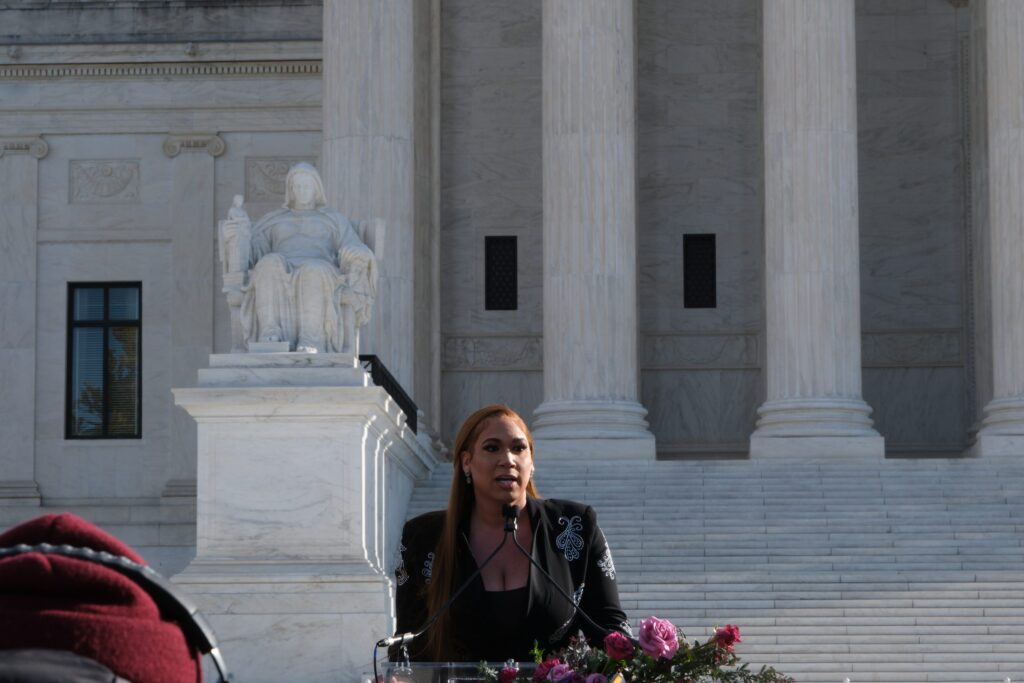
Photo by Sydney Carroll Mariah Moore of the Transgender Law Center speaks to demonstrators on the steps of the Supreme Court on Dec. 4.Photo by Sydney Carroll
The Tennessee law being challenged in Skrmetti was signed into law in March 2023 and bans transgender minors in Tennessee from accessing hormones, puberty blockers, and other medications used in gender-affirming care, even with parental permission. Notably, hormone treatments remain available for non-transgender minors with conditions like endometriosis. The bill makes it illegal for doctors to prescribe these treatments to transgender minors, and also contains ambiguous language regarding what they can “offer to perform on a minor,” creating anxiety for physicians who wonder if they’d even be able to discuss potential treatments with patients. Notably, Tennessee Solicitor General Matthew Rice also indicated that following this law’s logic, the state could also ban gender-affirming care for adults as well.
“What this law does is it explicitly bans those very same medical treatments just for transgender kids. So some kids can get that treatment and some kids can’t. In this country, that’s discrimination, and that’s unconstitutional,” Jace Woodrum, the executive director of the ACLU of South Carolina, said to the Voice. Woodrum is the first ever openly trans executive director of an ACLU affiliate.
The plaintiffs in the case are three sets of Tennessee parents with transgender children and one doctor, who argue that the law violates the equal protection clause of the 14th Amendment by restricting medical care on the basis of sex. In June 2023, a federal judge blocked the ban, but it was reinstated by the Sixth Circuit Court just two weeks later. In September 2023, a federal appeals court rejected a request to block the ban, a decision that was then appealed to the Supreme Court.
Bean Chapman, chair of the Knox, Anderson, and Blount county chapters of the Tennessee Equality Project (TEP), said that the Tennessee law, which was the first filed for the state’s legislative session that year, sends a message about the Tennessee GOP’s priorities. While groups like TEP alongside Democratic lawmakers did their best to fight the bill, they recognized that their chances of success were slim given the state’s Republican supermajority.
“That bill was pre-filed November 9, 2022, the day after the midterm election. And that was pre-filed to make a point that their priority for the 2023 legislative session was going to be targeting transgender kids receiving gender-affirming care,” Chapman said. “We also knew realistically that they were going to have the support to pass it.”
The plaintiff’s case was argued by Chase Strangio, an attorney from the ACLU who, on Wednesday, became the first openly trans attorney to argue before the Supreme Court in history.
“I think it’s very powerful for the movement for transgender equality that the highest court in the land sees and recognizes an advocate who is transgender,” Lucas Cameron-Vaughn, a staff attorney for the Tennessee ACLU who was in the courtroom, said in an interview with the Voice. “This is a really historic moment.”
Outside, several lawmakers gave speeches during the rally.

Photo by Katie Doran Sen. Ed Markey (D-Ma.) speaks at the rally.Photo by Katie Doran
“I’m doing this because, as many of you here know, freedom is not inevitable. It is fought for by people who say: No in the face of discrimination, no in the face of invasive laws that seek to limit what health care you can get, and no to the anti-justice and anti-freedom agenda driving attacks on gender-affirming care,” Massachusetts Senator Ed Markey said in a speech.
About a hundred counterprotesters also showed up to demonstrate outside the Supreme Court. They dressed in black and stood on the right side of the rally, crowding around a podium where conservative leaders gave speeches against gender-affirming care. The speakers included Georgia Representative Marjorie Taylor Greene, Alabama Representative Gary Palmer, Tennessee State Senator Jack Johnson, Tennessee State Representative William Lamberth, among others .
“No child should ever take any type of hormones or chemical castration pills to destroy their body before they’re ever old enough to vote, join the military, ever old enough to even be an adult. It is ridiculous. It’s the lies of the left. It’s a sickness. It’s an evil, and it’s an outrage,” Greene said in her speech.
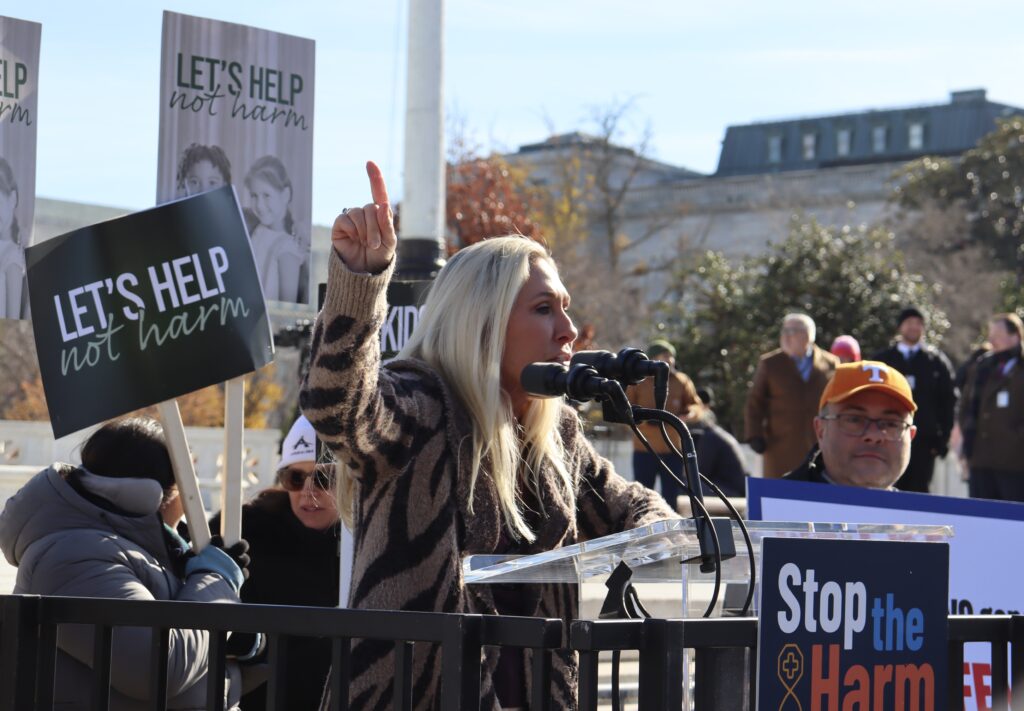
Photo by Katie Doran Rep. Marjorie Taylor Greene (R-Ga.) speaks at a rally in favor of the Tennessee law.Photo by Katie Doran
Gender-affirming care for minors often begins with puberty blockers, a reversible course of treatment that pauses puberty in order to prevent secondary-sex characteristics from developing. After puberty blockers, people may also receive hormone replacement therapy, which alters a person’s physical traits to be more aligned with their gender identity. Gender-affirming surgery among youth is rare. All decisions regarding a minor’s health care involve discussions between the patient, parents and guardians, and healthcare providers.
Currently, 26 states across the U.S. have passed laws banning gender-affirming care for minors, though there are currently lawsuits challenging the bans in 15 of those states currently. Out of the 300,000 transgender youth aged 13 to 17 in the U.S., nearly 40% currently live in a state where gender-affirming care is banned. States that have passed anti-trans legislation have seen up to a 72% increase in suicide attempts by trans and gender non-conforming teenagers in the years immediately after the legislation is passed.
Melody Hardin, a trans woman from Maryland who transitioned as a minor, said that she came to the rally because of what gender-affirming care did for her, and because of the fear of what life would look like for trans youth without it.
“I don’t think I would be alive if it weren’t for gender-affirming care,” Hardin told the Voice. “I had a really bad period in my life, and it would have been even worse if I had the idea of, ‘Hey, I don’t have the ability to be who I want to be—who I am.’”
Gender-affirming treatments are currently supported by every major medical association in the U.S., representing 1.3 million doctors. Less than 1% of those who receive gender-affirmation surgeries express any type of regret, and even fewer reverse their transitions. The American Academy of Pediatrics, the American Bar Association, NAACP Legal Defense Fund, and the National Women’s Law Center, and many other organizations filed amicus briefs, or legal documents submitted to help the court make its decision, in favor of the plaintiffs. They were joined by 20 states and 164 members of Congress.
“We need to listen to trans voices and medical professionals—gender-affirming healthcare saves lives. What individuals do with their own body is their decision, and shouldn’t be up to the government to rule over,” Reilly Souther (CAS ’27), the advocacy director for Georgetown College Democrats, wrote in a statement to the Voice. Souther was at the rally and helped organize a group of Georgetown students to attend.
Isabella Troi-Barzoban is a student at South Carolina State University who came to D.C. for the demonstration. She expressed frustration at the bill’s language and the anti-transgender sentiment behind it.
“You can’t legislate healthcare,” Troi-Barzoban said. “It’s so vaguely written, and it’s written from a place of hate—that’s the fundamental part of it.”
As protesters rallied outside, the justices inside the building seemed likely to uphold Tennessee’s law. The Court’s conservative majority repeatedly made comments and asked questions during the oral argument that suggested they believe the issue of legislating gender-affirming care should be left to the states, according to reporting by the Washington Post.
Regardless of the decision in Skrmetti, activists committed to continuing to advocate trans rights and access to healthcare.
“The life that I get to live today is made possible by transgender leaders who came decades before me. They made it possible for me to live this life, for me to be out, for me to access medical care, for me to have supportive friends and family. It would be a dishonor to their memory and their sacrifice and their work for us to give in to despair. We cannot give in to despair. We have to fight like hell if politicians, including president-elect Trump, come for transgender people. They’ve got to get through all of us,” Woodrum said.
Hardin echoed Woodrum’s sentiments and that she hopes that trans kids watching the Supreme Court battle and other controversies regarding gender issues know that there is a light at the end of the tunnel.
“To the trans youth out there who are struggling, it gets better,” she said. “Once you get the health care you deserve, it gets better, it gets much easier to live. Just hold on. Just keep going.”


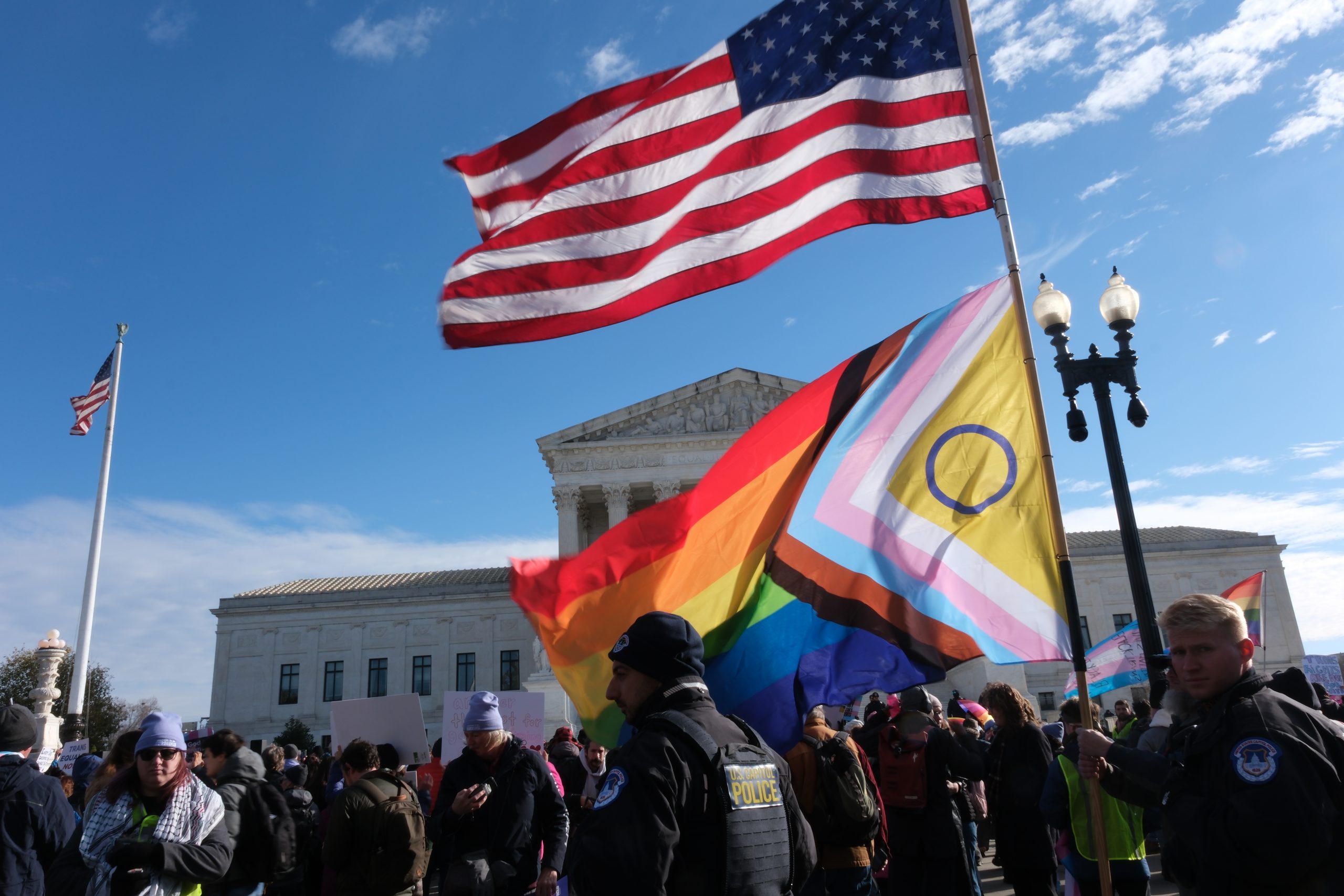

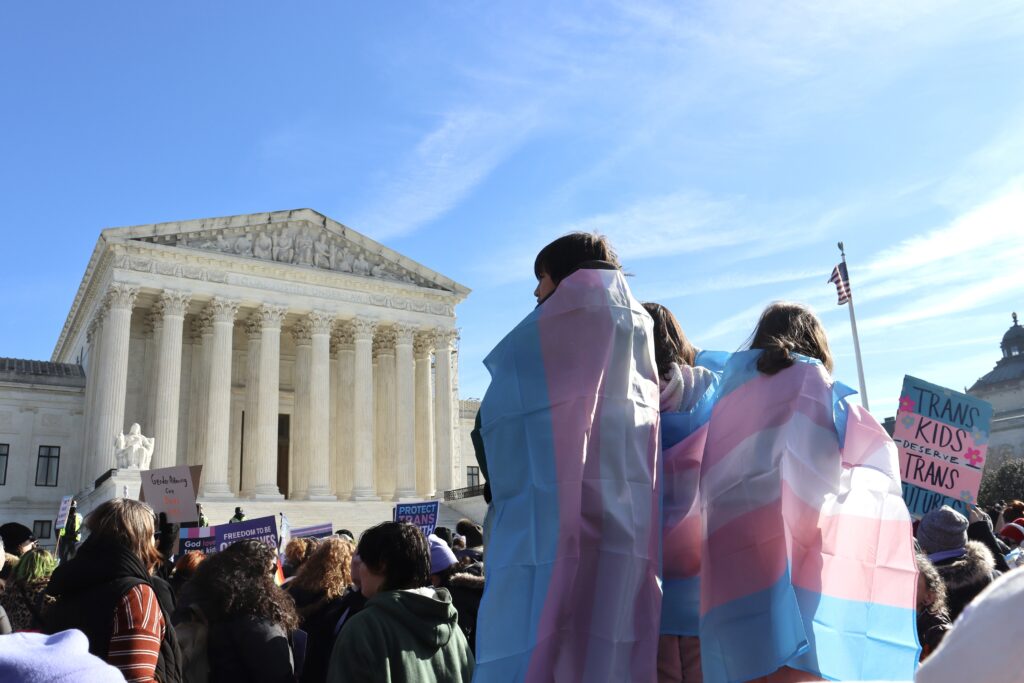
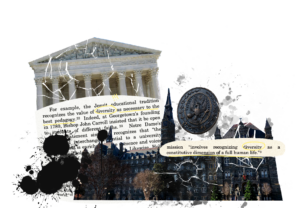


Love this. I will be sharing it on my Instagram in hopes that it reaches even more people. What a gift you have!